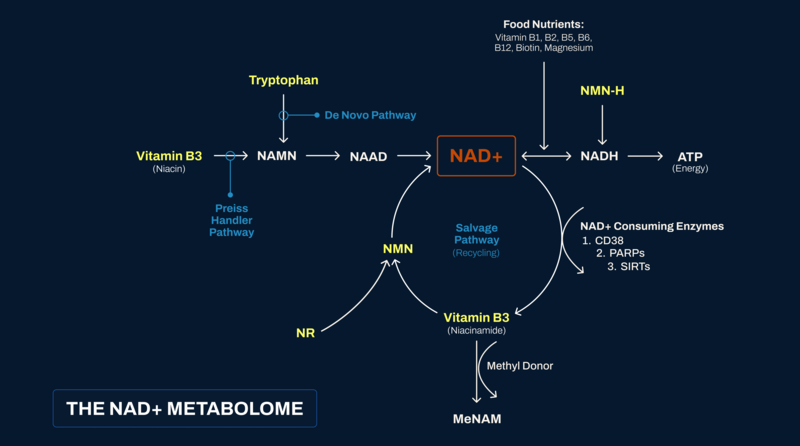NAD Precursors: Novel Agents for Optimizing Cellular Health and Longevity

NAD is an essential component to the longevity discussion. It is involved in half the body’s biochemical processes and is critical to the optimization of cellular energy. This has downstream effects in every tissue and body system. NAD levels decline as we age, yet our cells often need more to help us during the aging process. This makes boosting NAD levels vital for your longevity journey. But is there a way to help our bodies produce our own NAD?
This is where NAD precursors enter the conversation. NAD precursors like tryptophan, nicotinamide riboside, and NMNH are molecules that feed biochemical reactions to morph into NAD–our target molecule. There are a few different pathways that feed the creation of NAD in the body. (See below image). The precursors mentioned above all feed different pathways to comprehensively support the body’s optimal NAD biosynthesis.*
Nicotinamide riboside (NR) is a vitamin B3 derivative that supports the salvage pathway, or recycling pathway, for NAD synthesis. This is critical for making sure that we’re optimizing the precursors and stores that we already have. In clinical studies, supplementation with NR has been shown to help increase NAD levels. NR may also help support mitochondrial function, sirtuin activity, and many other body systems.*
Tryptophan is a well-known molecule that supports melatonin production in the body and is a critical precursor for protein synthesis and serotonin production. It also feeds into the De Novo pPathway of NAD synthesis, making it an important player in the longevity conversation.*
NMNH (Dihydro nicotinamide mononucleotide) is the reduced form of NMN and is metabolized through a separate pathway in the NAD metabolome. It has been studied for its high bioavailability and resistance to degradation. In an animal study, NMNH was shown to increase NAD levels in certain cells and tissues. NMNH may also help balance other biochemical pathways, including the TCA cycle, glycolysis, and cell growth.*
Apigenin is a flavonoid found in many fruits and vegetables, including parsley, celery, onion, oranges, and chamomile. While apigenin is not directly a precursor of NAD, it helps support NAD cellular levels through its relationship with CD38. CD38 is an NAD-consuming agent; apigenin works by blocking CD38’s activity, which helps maintain NAD levels.*
While this exciting biochemistry has the potential to help unlock many dimensions of healthy aging, it’s important to remember that more clinical research is needed before clinical conclusions can be made. Still, NAD boosters and their precursors may help support a healthy biological age and your longevity journey.*
-
* These statements have not been evaluated by the Food and Drug Administration. These products are not intended to diagnose, treat, cure, or prevent any disease.





